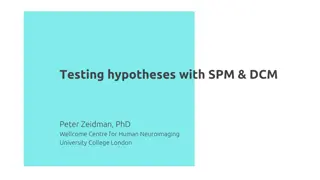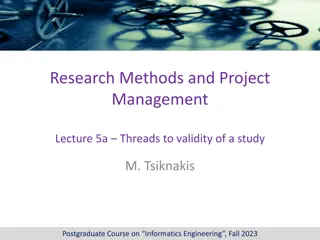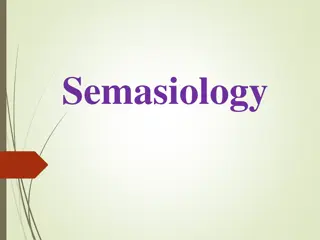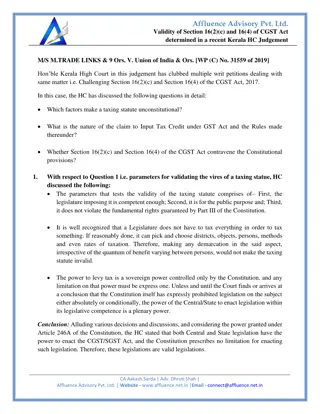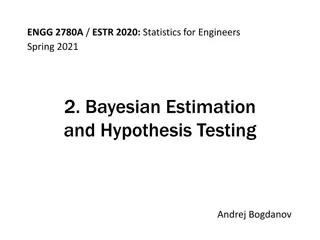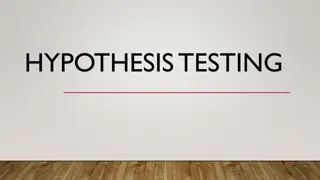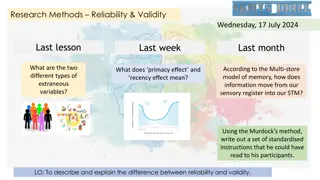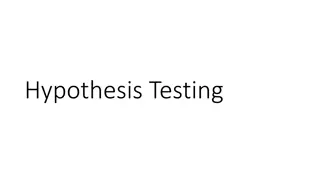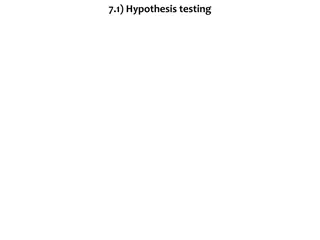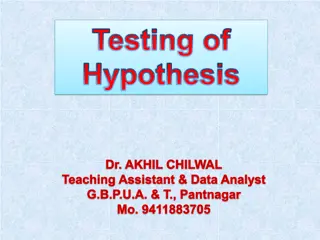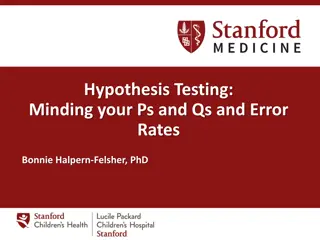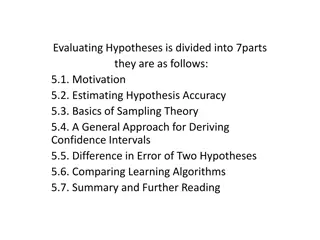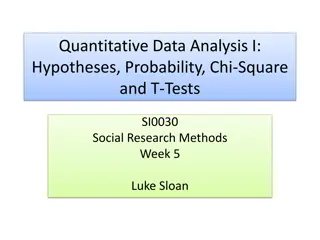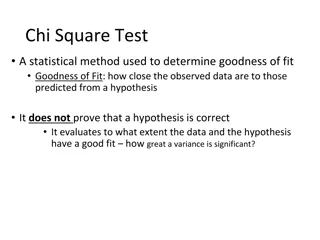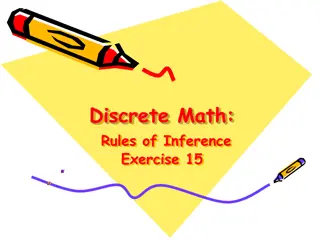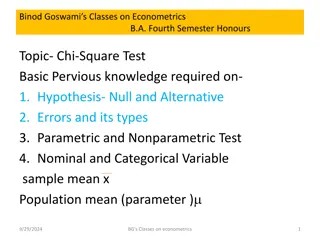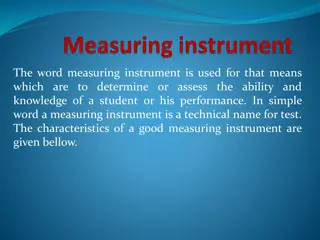Understanding Hypothesis: Meaning, Types, and Validity Conditions
A hypothesis is a provisional supposition used to explain a fact or phenomenon, serving as a starting point in investigations to establish causal connections. This article explores the meaning of hypothesis, different types, conditions for validity, and examples. Definitions by prominent philosophers such as J.S. Mill and Stebbing are presented, emphasizing the essential role of hypothesis in scientific inquiry. The process includes observing facts, forming hypotheses, applying deductive methods, and verifying conclusions.
Download Presentation

Please find below an Image/Link to download the presentation.
The content on the website is provided AS IS for your information and personal use only. It may not be sold, licensed, or shared on other websites without obtaining consent from the author. Download presentation by click this link. If you encounter any issues during the download, it is possible that the publisher has removed the file from their server.
E N D
Presentation Transcript
TOPIC: HYPOTHESIS, ITS MEANING, KINDS AND CONDITIONS OF VALID HYPOTHESIS. PRESENTED BY MR. DEBAJIT HAZARIKA DEPARTMENT OF PHILOSOPHY
INTRODUCTION: INTRODUCTION: A hypothesis is a provisional supposition which we make in order to explain some fact or phenomena. It seems that the nature is very complicated, sometimes it is difficult to find out exact relation between cause and effect. In order to find the cause or explanation of an effect or fact, a Hypothesis is a supposition or assumption without actual evidence or insufficient evidence. Hypothesis is a starting point of an investigation to discover and prove a causal connection. It is a kind of inference. It is based on insufficient evidence. The main objective of Hypothesis is to deduce a conclusion or exact cause of a fact. If the assumption has correspondence with the known truth or real fact then the hypothesis will become true or likely to be true.
EXAMPLES OF HYPOTHESIS: Example from science: Newton saw an apple fall on the ground and supposed that it was due to the attraction of the earth. This supposition or Hypothesis was subsequently proved to be true, and the Law of Gravitation was established. Example of a popular Hypothesis: On returning home in the evening, we find the glass- pane of the window has been broken. We make a supposition that a stone or a cricket ball or a similar object had been thrown against it from outside. After verification we find that the supposition is true.
DEFINITIONS OF HYPOTHESIS: According to J.S. Mill, A Hypothesis is any supposition which we make( either without actual evidence, or on evidence avowedly insufficient) in order to endevour to deduce its conclusion in accordance with facts which to be real; under the idea that if the conclusions to which the hypothesis leads are known truths, the hypothesis itself either must be or at least is likely to be true . According to Stebbing , Hypothesis is a tentative supposition which is put forward for explaining the fact that can not be understood without it . According to Coffey, A hypothesis is an attempt at explanation; a provisional supposition made in order to explain scientifically some fact or phenomena .
OBSERVATION OF FACTS. FORMATION OF A HYPOTHESIS. APPLICATION OF THE DEDUCTIVE METHOD. VERIFICATION.
1. OBSERVATION OF FACTS: We come to the contact of the fact through observation. Then question arise in our mind about the event or fact which will be explained. For example: by perceiving the falling apple, question arose in Newton s mind, why does the apple fall on the ground .
2. FORMATION OF A HYPOTHESIS: Since we have to explain the cause behind the fact or phenomena. Without proper evidence or insufficient data we are going to explain the fact or phenomena by taking some provisional supposition. For example: On the basis of observation, Newton formed a Hypothesis that probably the attraction of the centre of the may be the cause of the falling apple.
3. APPLICATION OF THE DEDUCTIVE METHOD: This stage is the deduction of the a certain conclusion from the probable and tentative supposition. For example: From the supposition Newton deduced a conclusion that the earth attracts all material bodies
4. VERIFICATION: If the conclusion which we deduce from the supposition have correspondence with the real fact then the Hypothesis will become true or likely to be true. For example: Newton s Law of Gravitation is verified as true.
: 1. Hypothesis Concerning Agent 2. Hypothesis Concerning Law 3. Hypothesis Concerning Collocation.
1. HYPOTHESIS CONCERNING AGENT: When we are unknown about the agent of the fact and if we frame a hypothesis regarding the agent and such hypothesis is called, Hypothesis Concerning the Agent . For example: a burglary is committed in my room, in order to know the thief, we may frame a hypothesis about the agent, it is called Hypothesis concerning the agent. A scientific example: the planet Uranus should move in a particular orbit due to the attraction of the unknown planets. Then the scientist made a supposition about the unknown agent and subsequently, the unknown agent was discovered as Neptune. It is a kind of Hypothesis concerning the Agent.
2. HYPOTHESIS CONCERNING LAW: Sometimes, it may be the case that we know the agent of the fact but the Law by which the agent acted, it is unknown to us. In this case we construct a hypothesis concerning the law through which the agent acted. This kind of Hypothesis is called Hypothesis Concerning the Law . For example: a burglary is committed in my room. We become to know that the servant is the agent. But it is unknown to me that how he committed it. Then we construct a hypothesis that he entered to the room by breaking the door. Scientific example: Newton knew the agent like, the sun, moon, earth but he didn t know how they attract upon each other. Newton supposed that their motion might be the due to their attracting one another.
3. HYPOTHESIS CONCERNING COLLOCATION. Sometimes we know the agent and also the law acted by the agent but we are unknown about the arrangement of circumstances. In such case we frame Hypothesis about the collocation. It is called Hypothesis Concerning the Collocation. For example of the theft, all members of the family are outside from the home keeping the servant alone.
CLASSIFICATION OF HYPOTHESIS IN MODERN SCIENCE: EXPLANATORY HYPOTHESIS DESCRIPTIVE HYPOTHESIS ANALOGICAL HYPOTHESIS ADHOC HYPOTHESIS WORKING HYPOTHESIS
EXPLANATORY HYPOTHESIS This is is a simple kind of hypothesis. It is framed for explaining an event. Here, The fact can be observed under suitable conditions. Here, the cause, agents, law all are needed to be explained.
DESCRIPTIVE HYPOTHESIS This is generally formed to offer a description of a complex event with a view to give an accurate description which helps in the investigation of phenomenon under investigation. It tries to symbolize the systematic relation among facts. It is generally formed to describe a geometrical representation. It is used in scientific investigation. It is also provisional.
ANALOGICAL HYPOTHESIS Analogical hypothesis means a hypothesis what is true for of one set of phenomena may be true of another set as both the set possess in common certain formal properties.
ADHOC HYPOTHESIS When an assumption is taken as true but it unable to explain the fact then we frame an another Hypothesis to explain the fact or phenomena. It is called Adhoc Hypothesis.
WORKING HYPOTHESIS: Working Hypothesis is a provisional supposition for guiding investigation. Sometimes we are unable to make any satisfactory supposition on the basis of the observation. In such a case we frame a hypothesis in the absence of better hypothesis, Only to start our investigation, also by knowingly that it is not the adequate explanation of the fact. It is called working Hypothesis. For example: Without knowing the exact nature of Current the scientists suppose that current is a liquid entity.
CONDITIONS OF VALID HYPOTHESIS: The hypothesis must be relevant. Testability or verifiability. Compatibility with previously well-established hypothesis and compatibility also with itself. Hypothesis should not be vague, indefinite, absurd or self contradictory. Predictive power. i) Observational Crucial instance. ii) Experimental Crucial instance. The hypothesis must be simple. The hypothesis must be based on facts and must have for its object a real cause or Vera cause.
CONCLUSION Hypothesis is the first stage of scientific investigation. It helps us in observation and experiment. It helps to deduce a conclusion. It is important to explain the facts. Hypothesis has a significant role in modern scientific investigations.


